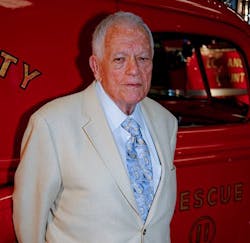'Paramedicine Pioneer' Dr. Walter Graf Dies at 98
Advanced life support care can trace its roots to the late 1960s, when a Los Angeles cardiologist started thinking outside the box,
Dr. Walter Graf, often referred to as a pioneer in paramedicine, died Oct. 18. He was 98.
The former president of the Los Angeles County Heart Association believed firefighters and ambulance personnel could save lives in the field if they had the proper training and tools.
So, he and a few others outfitted a white Chevrolet step van with appropriate equipment. It was designated 'the heart car.'
He and a colleague convinced county officials to train firefighters as paramedics.
Los Angeles County Fire Department Medical Director Dr. Clayton Kazan said in a statement: "It’s easy to take for granted the incredibly elaborate, sophisticated EMS system that we have today, but just 50 years ago, it did not exist. While ambulance transportation existed, virtually no medical care was provided until the patient arrived at the hospital..."
Kazan recalled Graf's contributions in a recent statement.
"...There was still no legislation which allowed them to practice because only nurses and physicians were licensed to perform procedures on patients. On July 14, 1970, Gov. Ronald Reagan signed the Wedworth-Townsend Act, which defined paramedic practice and permitted paramedics to function without the presence of a nurse or physician.
In 1999, the Daniel Freeman Paramedic Program merged with the UCLA Center for Prehospital Care, and the Paramedic Program is named in his honor.
"Dr. Graf has been honored as a 'Pioneer of Paramedicine.' The movement that he led has been responsible for saving innumerable lives worldwide in the 46 years since he introduced his 'Heart Car.'"
